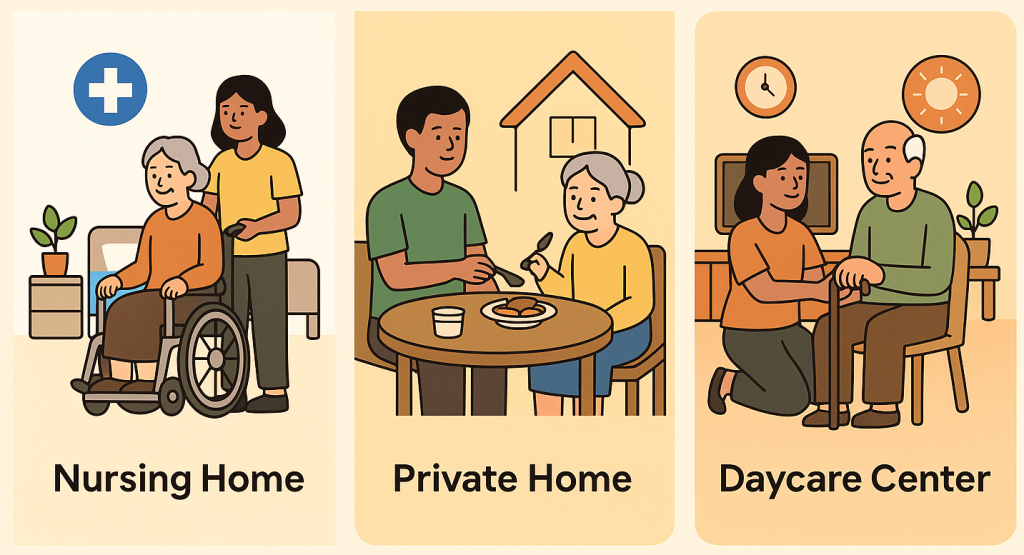For many Filipinos, caring for others isn’t just a job—it’s a way of life. Whether it’s looking after a younger sibling, checking on elderly neighbors, or helping a sick relative, caregiving is deeply woven into our culture. That’s why it’s no surprise that caregiver jobs in Taiwan for Filipinos have become one of the most accessible and meaningful work opportunities abroad.
With familiar values, manageable language barriers, and stable long-term contracts, caregiving in Taiwan often feels like an extension of what we already do at home.

Why Caregiver Jobs in Taiwan Appeal to Filipinos
Taiwan has one of Asia’s fastest-aging populations, and with that comes a growing need for compassionate, reliable caregivers. Filipinos, known globally for their dedication and warmth, are a perfect match.
- Cultural Compatibility: Many Taiwanese families value close-knit caregiving styles, similar to Filipino family traditions.
- Work Environment: Whether in homes, nursing facilities, or adult daycare centers, work environments in Taiwan are generally safe and well-regulated.
- Language & Adaptability: Basic Mandarin is helpful but not always required—agencies often provide language training. Filipinos’ adaptability and English skills are a bonus.
Caregiver Job Types and Work Settings
Most caregiver roles fall under elder care, which includes:
- Assisting with daily routines (bathing, feeding, medication)
- Providing companionship and emotional support
- Monitoring health conditions
Typical work settings include:
- Private residences
- Elderly care homes
- Adult daycare centers
Some Filipinos also assist persons with disabilities or chronic illnesses. While the core tasks remain similar, specialized training may be needed.

Salary and Benefits of Caregivers in Taiwan
As of 2025, the average monthly salary for caregivers in Taiwan is around USD 1,274 (approximately PHP 72,000). However, rates vary depending on experience and employer terms:
- Entry-level: Slightly below average (around USD 1,200)
- Mid-career: Up to 10% more
- Experienced: Up to 18% more
Additional notes:
- Some employers offer annual bonuses.
- There may be deductions for food and accommodation (always check contract terms).
- Overtime pay is available depending on the job arrangement.
Pro Tip: Clarify deductions and benefits in writing. Don’t rely solely on verbal promises.
How to Apply for a Caregiver Job in Taiwan: Step-by-Step Guide
Here’s how to apply legally from the Philippines:
1. Find a Licensed Recruitment Agency
- Look for DMW-accredited agencies such as GETS International Development Manpower Services Inc.
- You can verify licenses via the DMW website.
2. Prepare Your Documents
- Valid passport
- PSA birth certificate
- UMID or National ID
- Voter’s ID or Certificate
- Proof of SSS contributions
- NCII Caregiving certificate or nursing-related qualification
- Medical clearance from an accredited clinic
3. Submit Your Application
- Send your resume, employment certificates, training credentials, and ID documents to the agency.
4. Attend Interviews & Training
- Interviews can be virtual or in person.
- Agencies may offer pre-departure orientation and caregiving refreshers.
5. Sign Contract & Process Work Visa
- Once accepted, you’ll be issued a job contract.
- The agency will guide you through visa processing.
6. Deployment
- Upon completion of all requirements, you’ll receive a deployment schedule.
- Orientation continues upon arrival in Taiwan.
Pro Tip: Avoid fixers. Always go through official, accredited agencies to protect yourself from scams.
Requirements for Filipino Caregivers in Taiwan
Here are the qualifications employers and agencies look for:
Education & Training
- A college degree is preferred.
- TESDA NCII Caregiving certificate or similar nursing credentials are often required.
Experience
- Prior work in elder care, nursing homes, or similar fields is a big plus.
Health & Character
- Physical stamina and mental resilience
- Patience, compassion, and communication skills
Pro Tip: Keep copies of all training certificates, medical clearances, and employment records. These add weight to your application.
Tips for Smoother Adjustment and Success on the Job
- Learn Basic Mandarin: Simple phrases can go a long way.
- Set Boundaries Early: Understand your rights and discuss workload expectations upfront.
- Stay Connected: Join Facebook groups for Filipino caregivers in Taiwan for advice and community support.
- Understand Work Culture: Respect, punctuality, and humility go a long way in Taiwanese households.
- Save Smart: Take advantage of your stable income to build savings or support your family wisely.
Video: TAIWAN FACTORY WORKER VS. CARETAKER Alin ang pipiliin mong trabaho
This video explores the key differences between working as a factory worker and a caretaker in Taiwan, helping viewers understand which job might be the better fit for them. It provides insights into salary, working conditions, and job responsibilities, offering valuable guidance for overseas Filipino workers (OFWs) considering employment in Taiwan. Through firsthand experiences and community discussions, the video sheds light on the pros and cons of both career paths, allowing viewers to make an informed decision. Whether one is drawn to the stability of factory work or the personal connection of caretaking, this video serves as a helpful resource in navigating these opportunities.
Conclusion
Caregiver jobs in Taiwan for Filipinos are more than just a source of income—they’re a continuation of a deeply human value: caring for others. With the right preparation, patience, and passion, you can build a stable, meaningful career abroad that stays true to who you are.
Ready to take the first step? Start with a trusted agency, get certified, and embrace the opportunity to care, grow, and thrive in Taiwan.
